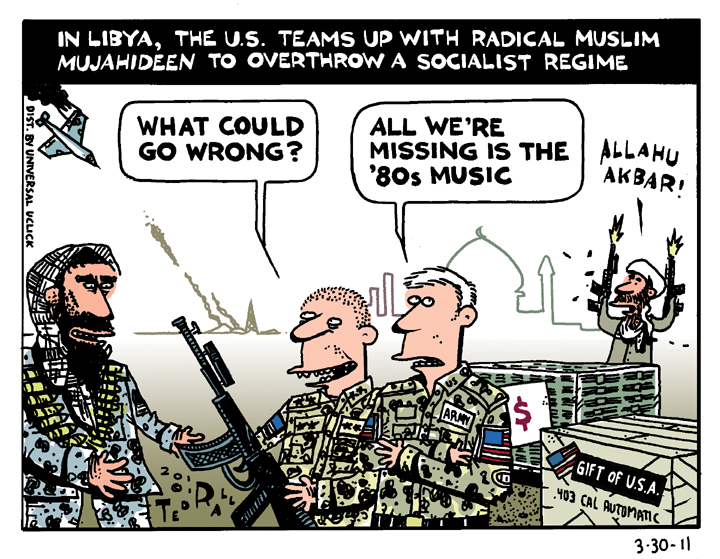Why Is the FBI Helping a Monstrous Dictator?
Forget the IRS, AP and Benghazi. The real scandal this week — the corrupt politicization of the nation’s top law enforcement agency — is President Obama’s decision to carry water for one of the world’s most evil dictators.
In a little-noticed move, Obama’s FBI has arrested Fazliddin Kurbanov, a 30-year-old Uzbekistani political dissident who, were this 1983, would be dubbed a “freedom fighter.”
Kurbanov faces the generic catchall charges used since 9/11 by the feds against low-level Islamists: conspiracy to provide material support to a foreign terrorist organization — in this case, the Islamic Movement of Uzbekistan (IMU) — and conspiracy to provide material support to (individual) terrorists. As usual, the “material support” charge doesn’t amount to much: the indictment alleges that he researched and made videos about how to make IEDs to use in Uzbekistan.
Major plot point: Kurbanov’s “terror plot” did not target the United States.
Nearly as important: the IMU is not at war with the U.S.
Originally based in rural Tajikistan and southern Kyrgyzstan, the IMU’s goal is to overthrow Uzbekistani President Islam Karimov, the most brutal of the dictators that have run the Central Asian republics since the collapse of the Soviet Union.
Karimov’s regime brooks no dissent: torture and murder of political opponents (and of businesspeople who refuse to pay bribes) is widespread. Officialdom is breathtakingly corrupt, sucking the oil- and gas-rich republic dry. Universally feared and reviled, Karimov is best known for boiling dissidents such as Mazafar Avazov and Khuzniddin Alimov to death (details and a gruesome photo of the 2002 boilings can be found in my book “Silk Road to Ruin: Is Central Asia the New Middle East?“), and for personally orchestrating the 2005 Andijon Massacre, in which at least 400 civilians were slaughtered by Uzbek security forces.
After Andijon, even the ethics-deficient Bush Administration decided that enough was enough, pulling U.S. forces out of Kashi-Khanabad airbase, which it had leased since 2001, and slashing military aid.
Which did nothing to rein in the tyrant. “The Uzbek constitution imposes a two-term limit, but Karimov was elected to a third term…His government engages in routine torture of citizens and has subjected dissenters to forced psychiatric treatment,” reports Parade magazine. All three of Karimov’s “opponents” in the 2007 election campaigned on his behalf.
Even by the cynical standards of international realpolitik, Karimov is radioactive — the kind of over-the-top despot Americans normally consider targets of “regime change” or at least trade sanctions. No civilized country should maintain diplomatic relations with Karimov, a tyrant whose abuses equal or exceed those of Saddam Hussein and Moammar Gaddafi.
“Radioactive” is an unfortunate choice of words, since Uzbekistan’s uranium mines (along with vast reserves of Caspian Sea natural gas, oil, and a pipeline and refinery network strategically linked to its petroleum-rich neighbors Kazakhstan and Turkmenistan) is part of the reason the United States is sucking up to him.
Rather than targeting Karimov with drones or cruise missiles, Obama has the butcher of Andijon on speed dial, reaching out in 2011 to ask the Uzbek leader for permission to ship war materiel through his benighted country into U.S.-occupied Afghanistan. In 2012, despite a Human Rights Watch report that found that life under Karimov had gotten worse since Andijon, Secretary of State Hillary Rodham Clinton and President Obama agreed to restore Karimov’s billion-dollar aid package.
Even in this economy, it seems, a billion bucks only goes so far. To further ingratiate the U.S. to Karimov, the White House has targeted the IMU. Bear in mind, the IMU has never attacked the U.S. Even though a U.S. airstrike killed an IMU founders in 2001, the group has never declared its intent to attack the U.S. Its beef is with Islam Karimov; its goal is to establish an Islamist state in Uzbekistan.
The IMU’s misfortune has been to fall on the wrong side of the “enemy of our friend is our enemy” equation. We’re in bed with Karimov and his fellow Central Asian dictators. Our icky prisoner-boiling pals hate the IMU.
No doubt, the IMU is a violent insurgent group. During one of its periodic summer offenses, the IMU kidnapped four American mountain climbers in early 2000 — an offense that prompted Bush to declare the group a State Department-designated terrorist organization. But the fact that the climbers were American appears to have been unrelated to their capture. IMU offensives also swept up Tajik and Kyrgyz civilians and soldiers, and four Japanese geologists. (Kyrgyz security forces claim to have disrupted a 2003 IMU plot to blow up the U.S. embassy in Bishkek, but such claims, often ploys to attract U.S. foreign aid, should be met with skepticism.)
Like many radical Muslim groups in Asia, some members of the IMU — a small cadre of fighters estimated to number between 300 and 500 men — trained in Al Qaeda camps in Afghanistan during Taliban rule. After the 2001 U.S. invasion they fled across the border into Pakistan’s Tribal Areas, where they established alliances with and fought alongside various Pashtun Islamist groups. IMU fighters have clashed with U.S. occupation forces in Waziristan and Afghanistan. But the IMU has shown no sign of bringing the fight to the U.S. IMU ideology is local and regional, limited to spreading Sharia-based governments first and foremost in Uzbekistan, and in countries like Pakistan if possible. No one — not even the FBI — alleges that the IMU plans to attack the U.S.
The U.S. government is at war with radical Islam. The question for Americans is: In a conflict between a monstrous dictator and a small group of would-be revolutionaries trying to overthrow him, should we take sides — especially the side of the dictator?
(Ted Rall’s website is tedrall.com. His book “After We Kill You, We Will Welcome You Back As Honored Guests: Unembedded in Afghanistan” will be released in November by Farrar, Straus & Giroux.)
COPYRIGHT 2013 TED RALL

